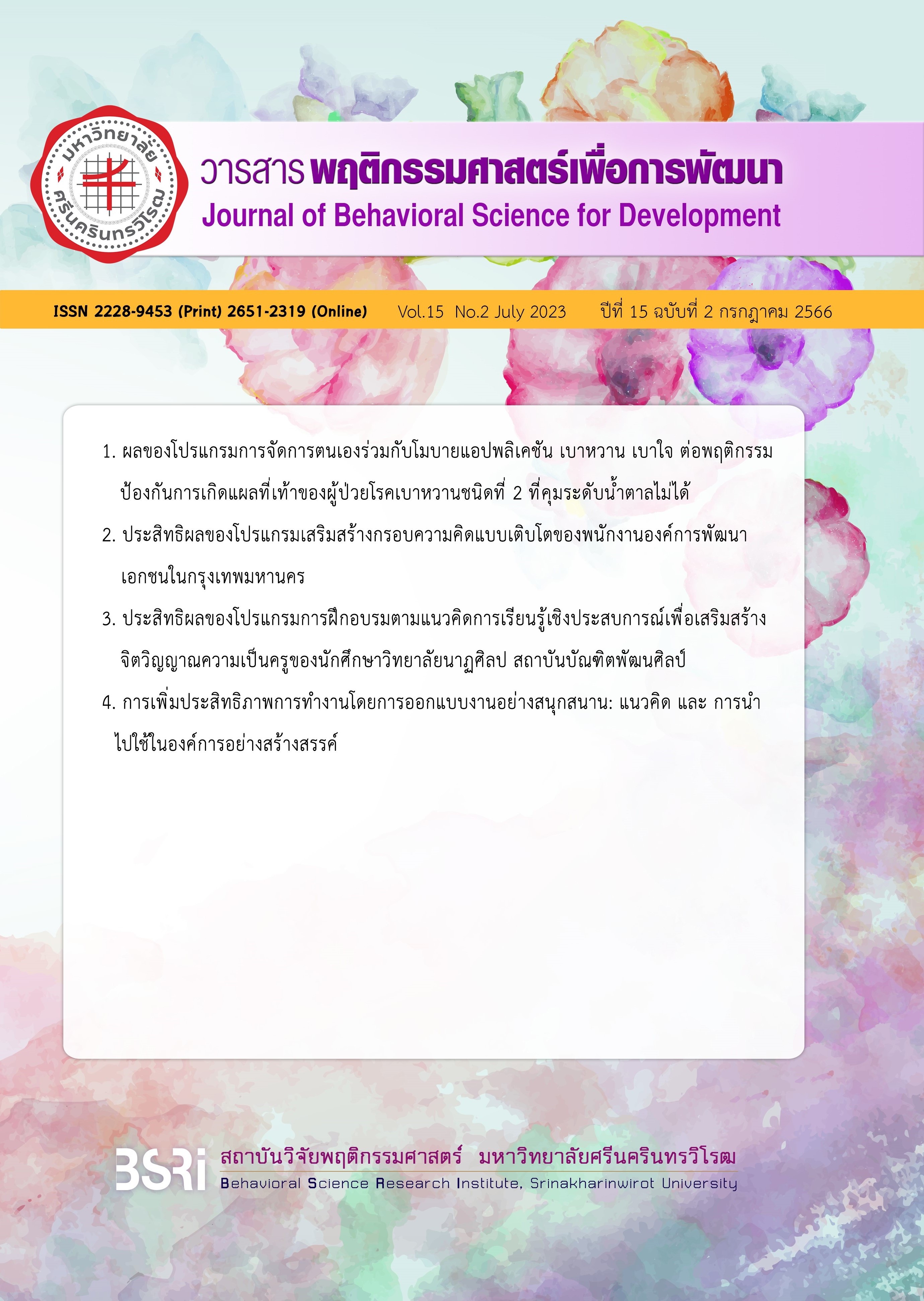Effects of the Self-Management Program with Baowan Baochai Mobile Application for Foot Care Behaviors Prevention among Uncontrolled Type 2 Diabetes Mellitus
Keywords:
Uncontrolled type 2 Diabetes Mellitus, Self-Management, Mobile Application, Foot Care Behaviors PreventionAbstract
This quasi-experimental research aimed to study the effects of the self-management program with Baowan Baochai mobile application for foot care behaviors prevention among adults and elderly with uncontrolled type 2 diabetes mellitus. Sixty people were recruited and randomly assigned into the experimental group (n=30) and the comparison group (n=30), who meet the inclusion criteria and a match pairing method which performed according to blood glucose values and education level. The Instruments consist of the self-management program with Baowan Baochai Mobile Application and for foot care behaviors questionnaires (a=.87). Data were analyzed by two-way ANOVA. The result showed that the experimental group had the interaction between the self-management program among adults and aging with uncontrolled type 2 diabetes mellitus on foot care behaviors prevention (F=9.13, P=.004). The mean scores for foot care behaviors in the experimental group higher than the comparison group with statistical significance in both adults and elderly groups. When comparing between the experimental and the comparison group, it was found that in the experimental group, both adults and elderly had better foot care behaviors. Nevertheless, in the comparison group, it was found that in adults’ group had significantly better foot care behaviors than the elderly group (P < .05). In conclusion, both the adult and the elderly had better foot care behaviors after receiving the program. This indicates that the program is suitable for promoting foot care behavior among adults and the elderly. Therefore, health care providers can use mobile applications for the elderly as well as adults.
References
American Diabetes Association. (2022). Standards of medical care in diabetes-2022. Diabetes Care 2022;45(Suppl.1): S3. https://doi.org/10.2337/dc22-SPPC
Creer, T. L. (2000). Self-management of chronic illness. In M. Doekaert (Ed.), Handbook of self- regulation (pp.601-629). Academic.
Diabetes Association of Thailand (DMTHAI). (2017). Clinical practice guideline for diabetes 2017.
Diabetes Association of Thailand under The Patronage of Her Royal Highness Princess Maha Chakri Sirindhorn; 2017. [in Thai]
Duangklad, K., Lapvongwatana, P., & Chansatitporn, N. (2020). Improvement of self-management program in uncontrolled type II diabetes patients. Journal of Health and Nursing Research, 36(1), 66-83. [in Thai]
Homchui, P., Wanaratvijid, C., & Pratoomsoot, C. (2020). Effect of self-Management support for self-care behavior and blood glucose level in patients with type 2 diabetes mellitus. Boromarajonani College of Nursing, Uttaradit Journal, 12(1), 240-254. [in Thai]
Hongsawong, S. (2022). The effect of a self- management program of type2 diabetes mellitus patients. Journal of Public Health, 28(3), 411-417. [in Thai]
International Diabetes Federation. (2017). IDF Diabetes Atlas (8th Ed.). http://www.diabetesatlas.org/resources/2017-atlas.html
Kongpetch, C., Yamockul, A., & Artsalee, R. (2021). Health promotion for the healthy elderly. Thai Journal of Nursing, 70(4), 44-51. [in Thai]
Lalun, A., & Wirunphan, B. (2021). Effects of self-management programs on Hemoglobin A1C levels and quality of life in people with diabetes mellitus in the district of Kanghhro Hospital, Chaiyaphum Province. Journal of Boromarajonani College of Nursing, Surin, 11(1), 66-80. [in Thai]
Lazo-Porras, M., Bernabe-Ortiz, A., Taype-Rondan, A., Gilman, R. H., & Malaga, G. (2020). Foot thermometry with mHeath-based supplementation to prevent diabetic foot ulcers: A Randomized controlled trial. Welcome Open Research, 5(23), 1-32. https://doi.org/10.12688/wellcomeopenres.15531.2
Ministry of Public Health. (2021). Situation on NCDs prevention and control in Thailand. Department of Disease Control. http://203.157.212.7/uthkpi64/document/91.pdf [in Thai]
National Statistical Office, Ministry of Digital Economy and Society. (2022). Survey results of the elderly population in Thailand 2022. National Statistical Office. [in Thai]
Phormpayak, D., Ajchariyasakchai, M., & Pamtaisong, S. (2017). Factors relating to foot ulcers in persons with type 2 diabetes. Journal of Health Science, 26(2), 354-361. [in Thai]
Pomthong, K., Masingboon, K., & Kunsongkeit, W. (2019). Factors influencing foot care behaviors among type II diabetes mellitus at risk for diabetic foot ulcer. Journal of Nursing and Health Care, 37(4), 109-118. [in Thai]
Saichana, S., & Srinuan, C. (2021). Factors affecting the usage behavior of the QUEQ application in Bangkok. Journal of Industrial Education, 17(3), 156-165. [in Thai]
Simasingha, N., Paholpak, P., & Suraamornkul, S. (2021). Prevalence of the stratified risk to develope diabetic foot ulcer in type 2 diabetes patients. Vajira Medical Journal: Journal of Urban Medicine, 65(Supplement November), 63–74. https://doi.org/10.14456/vmj.2021.53 [in Thai]
Sirimongkollertkul, N., Singmanee, C., Rattanawichai, T., & Pongleerat, S. (2020). The development of an application for monitoring diabetic patients in the community. Royal Thai Army Medical Journal, 73(3), 141-150. [in Thai]
Srisomthrong, K., Chintanawat, R., & Sucamvang, K. (2017). Self-Management Supporting Programme and Its Impact on Foot-Care Behaviour of Elderly Type-2 Diabetes Patients. Thai Journal of Nursing Council, 32(3), 120-134. [in Thai]
Tabsee, S. (2020). Factors related to self-care behavior of the elderly in Kangkrajan district, Phetchaburi province. Journal of Prachomklao College of Nursing, Phetchaburi Province, 3(1), 14-29. [in Thai]
Watthana, P., Jantacumma, N., & Pantaewan, P. (2022). Effects of the self- management program with Chan Chana mobile application for cerebrovascular disease prevention in risk group Sukhothai province. Journal of police nurse, 14(1), 92-104. [in Thai]
Whiting, D. R., Guariguata, L., Weil, C., Shaw, J. (2022). IDF diabetes atlas: global estimates of the prevalence of diabetes for 2011 and 2030. Diabetes Research and Clinical Practice, 94(3), 311-321.
World Health Organization. (2022). WHO Mortality Database. http://apps.who.int/healthinfo/statistics/mortality/causeofdeath_query
Downloads
Published
How to Cite
Issue
Section
License
Copyright (c) 2023 Journal of Behavioral Science for Development

This work is licensed under a Creative Commons Attribution-NonCommercial-NoDerivatives 4.0 International License.



